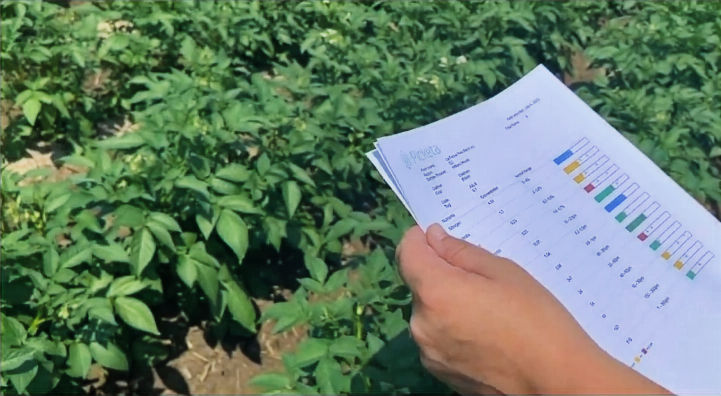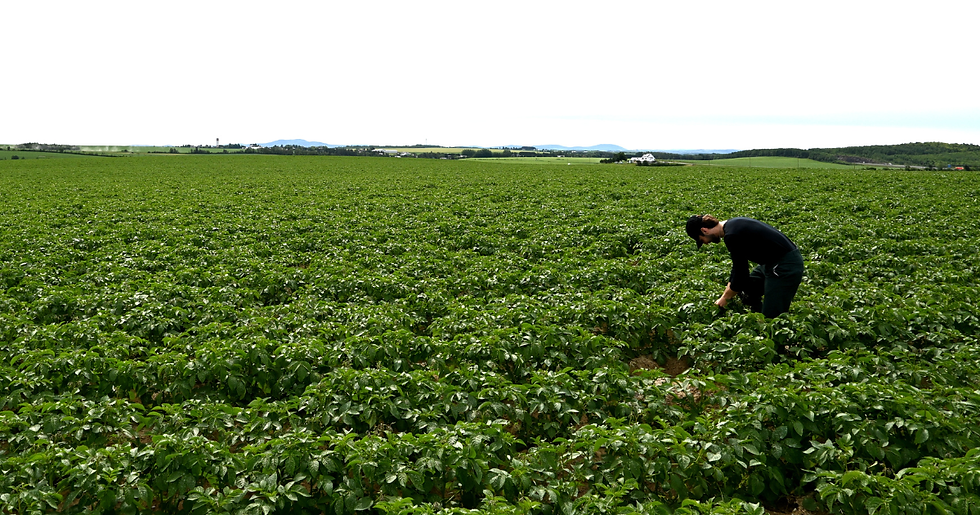The Future of Plant Tissue Analysis: How Agronomists Can Stay Ahead with Picketa LENS Technology
- Alexa Campbell

- Feb 8, 2024
- 3 min read
When it comes to agriculture, staying ahead is not just a goal; it's a necessity. More than ever agronomists find themselves at the intersection of tradition and innovation. Enter Picketa's Leaf-Evaluated-Nutrient-System (LENS), a groundbreaking technology designed to redefine how agronomists approach plant tissue analysis, helping them make timely and informed decisions about their nutrient use.
What is the Picketa LENS?
The Picketa LENS is a portable real-time plant tissue analysis tool that estimates the nutrient content for 13 key macro and micronutrients in plant samples.
The LENS utilizes ground-based sensors that analyze leaf canopy reflectance, applying reflectance data across a wide wavelength range to machine learning algorithms trained on labeled data for chemical property predictions (Chemometrics). The LENS transmits the collected data to a user-friendly web application, providing near-instantaneous results. Agronomists can effortlessly access comprehensive data across their various fields and farms, monitor trends, and seamlessly share the information with growers.
The nutrient data delivered by the LENS in minutes inspires a shift away from the traditional method of monitoring plant nutrition, which involves the tedious process of sending samples to a laboratory.

Benefits of Embracing the LENS technology
1. Real-time Precision
The LENS delivers instant data on the nutrient status of your crops, allowing you to tailor your fertilizer application to meet specific needs and empowering agronomists to make proactive decisions for optimal crop health. With real-time information, the LENS accurately communicates your plants' true condition, so that you know exactly what it needs, how much it needs, and when it needs it, preventing any overapplication of costly fertilizers and optimizing resource allocation. By eliminating any delays in receiving results, you enhance your ability to identify any potential hidden deficiencies promptly, reducing the risk of discovering them too late.
2. Seamless Integration into Workflow
The Picketa LENS seamlessly integrates into your existing workflow, ensuring a frictionless adoption process for agronomists and growers alike. Designed with versatility in mind, the LENS easily fits into diverse agricultural environments, enhancing operational efficiency without disrupting established practices. Whether you are managing expansive farms, or conducting research, the LENS is an indispensable tool for efficiency, effortlessly becoming an integral part of your day-to-day activities.
3. Data-Driven Decision Making
The LENS offers not only immediate advantages but also cultivates valuable long-term insights into crop management. As you amass this data over time, it unveils insights into the nutrient needs, growth patterns, and responses of your specific crops to diverse conditions. This wealth of knowledge enables informed decisions across farming practices, including seed selection, planting approaches, and crop rotation plans. Turn your farm into a data-driven operation, where decisions are grounded in evidence rather than speculation.
4. Cost Effective
Invest in agricultural efficiency with the LENS, and experience significant cost savings. By providing swift and accurate nutrient analysis, our technology eliminates the need for costly traditional lab testing, allowing you to optimize resources and maximize your budget for a more sustainable and profitable farming operation.
5. Accessible and Intuitive
Agronomists now have the flexibility to access critical data remotely, transcending the confines of physical location. Whether in the field or at the office, the LENS ensures nutrient information is readily available. The LENS has an intuitive online dashboard that transforms intricate data into comprehensible visuals. Agronomists can effortlessly navigate through results, identify patterns, and pinpoint nutrient deficiencies. The accessible user-friendly interface simplifies decision-making processes, fostering efficiency and informed choices.

How the LENS works
1. Map your Farms and Fields: Create field boundaries by using shapefiles or manually drawing fields in the Fieldbook application and pin each sample location you plan to take samples from in each field.
2. Leaf Sample Collection: Collect leaf samples from the predetermined scanning locations, ensuring representation from various parts of the field.
3. Optical Probe Scanning: Follow the simple directions on the LENS Screen and use the probe to scan at least 10 leaflets per sample. This process collects intricate details about the nutrient composition of the plant.
4. Cloud-Based Analysis: The scanned information is transmitted to Picketa's Fieldbook platform, where sophisticated machine learning models interpret the data.
5. Timely and Informed Decision Making: Results are promptly displayed on the online Fieldbook dashboard, offering agronomists and growers real-time insights into nutrient levels, deficiencies, and overall plant health. The dashboard serves as a central hub for making informed decisions, fostering proactive and efficient crop management.
Ready to revolutionize your approach to plant tissue analysis? Explore the Picketa LENS and transform your farm into a data-driven operation. Learn more at Picketa.com or email info@picketa.com with your questions.






Comments